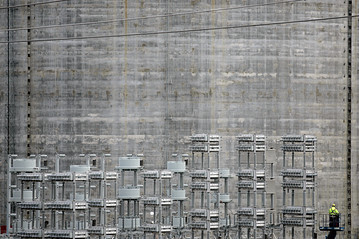BHP Billiton said Wednesday it may sell its 33.3% stake in Guinea Alumina, as its joint-venture partners seek ways to advance a multibillion dollar project to mine and process bauxite in Guinea that has suffered repeated delays.

It comes as BHP overhauls its international mining assets to focus on high-margin commodities like coking coal and iron ore, where it is among the biggest producers by volume, and regions with enough reserves to sustain output for decades.
That strategy has already seen BHP sell a non-operated stake in a South African mineral sands operation to Rio Tinto, while its Canadian diamonds unit is also under review ahead of a possible sale.
The Guinea Alumina venture proposes to develop a mine with an annual output capacity of 10 million metric tons of bauxite, a key ingredient in making aluminum for use in products ranging from drinks cans to aircraft. It also plans an alumina refinery with a capacity of more than 3.3 million tons a year around 110 kilometers from the port of Kamsar.
However, the Guinea Alumina project has suffered repeated delays and remains at a feasibility stage despite the joint venture investing a combined US$782 million by the end of last year.
BHP’s joint venture partners include Mubadala Development Co., which leads the Abu Dhabi government’s diversification strategy away from the oil and gas sector, Dubai Aluminium Co. and Toronto-listed Global Alumina Corp.
“The joint venture partners continue to find a solution that would make this project executable. Solutions include finding new owners, including for BHP Billiton’s share in the joint venture,” a BHP spokeswoman said.
BHP is working with investment bank Lazard to find a buyer for its 33.3% interest in the Guinea Alumina venture, a person familiar with the matter said.
Political instability has posed a major challenge for mining companies in Guinea, which Citigroup estimates to have a quarter of the world’s reserves of bauxite and also large deposits of iron ore.
Since its 1958 independence from France, Guinea has been ruled mostly by dictators and leaders of military coups. Democratic elections were held in 2010 after Capt. Moussa Dadis Camara, who had ruled the country since a bloodless coup in December 2008, was incapacitated after an attempted assassination several months earlier.
This political instability has also contributed to rising policy risk for investors.
Last year, Rio Tinto agreed to give the Guinea government as much as 35% ownership of its Simandou iron-ore project, resolving a dispute that held up more than US$10 billion investment.
At the same time, aluminum prices have yet to fully recover from the slump that followed the financial crisis as the metal is more dependent on ordinary consumer goods than other commodities such as iron ore. This in turn has weakened demand for bauxite.
Australia is the world’s biggest producer of bauxite, ahead of China and Brazil, according to Citigroup. Guinea lags in fifth place, largely due to years of under-investment, with the bulk of its production coming from the Boke mining belt near the Atlantic coast.
